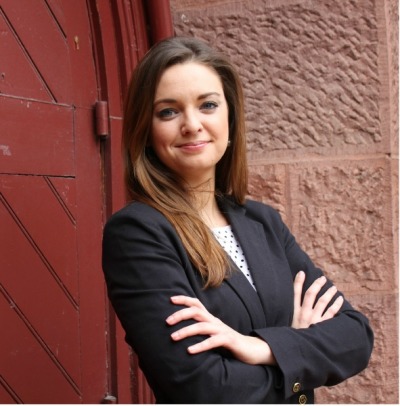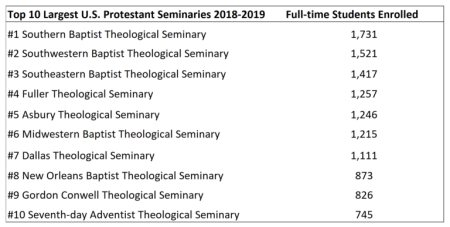What are America’s largest seminaries in 2019?

In August 2016, I set out to understand the state of Protestant seminaries in the United States by evaluating student enrollment among accredited schools. The results revealed that students seeking training for church ministry were overwhelmingly attracted to orthodox, evangelical Protestant institutions. Meanwhile, the smallest accredited Protestant seminaries in the nation included three Episcopal seminaries and two Cooperative Baptist Fellowship (CBF) seminaries.
What of those rankings today? I wondered if there have been any significant changes in attendance at America’s largest Protestant seminaries over the last four academic years. And what of those small, progressive seminaries? How have they fared over the last three years? Had they seen miraculous growth or a continued decline?
Given that Fuller Theological Seminary fell from the number #1 position, a progressive Baptist seminary shuttered its doors, and a Seventh-day Adventist school now ranks among the top 10 largest seminaries, there are, indeed, changes worth noting here.
Reports made available through the Association of Theological Schools (ATS) provide data for member schools from 1975 until the 2018-2019 academic school year. To be counted in this evaluation, seminaries must be ATS-accredited and degree-granting institutions and not departments or houses of studies within universities. Also, this compiled list is only a comparison of full-time students enrolled (FTE) in seminaries in the United States that are affiliated with Protestant denominations.
Notably, today, the top three largest Protestant seminaries in the United States are Southern Baptist Convention-affiliated institutions. This is an interesting change from 2015-2016, when Fuller Theological Seminary claimed the #1 largest position, with 1,542 full-time students at the time.
Southern Baptist Theological Seminary is now the largest Protestant seminary in the country, after a 20 percent rise in FTE between the 2015-2016 and the 2018-2019 academic school years. Southwestern Baptist Theological Seminary experienced an impressive 32 percent increase in FTE between those same academic school years.

Nearly all of the top 10 schools in 2015-2016 experienced growth except for Fuller and Trinity Evangelical Theological Seminary. Fuller, an interdenominational Protestant school, saw an 18 percent decline in FTE between the 2015-2016 and 2018-2019 academic years. Trinity actually saw an increase of 43 full-time students between 2016 and 2017 before experiencing a slight ten percent decline in FTE between the 2015-2016 and 2018-2019 academic years.
Seventh-day Adventist Theological Seminary–the seminary associated with Andrew University in Berrien Springs, Michigan–moved into the #10 position, after a seven percent increase in FTE between 2015-2016 and 2018-2019.
While the six SBC-affiliated seminaries were (and still are) among the largest in the U.S. back in 2016, two liberal CBF-affiliated institutions were among the smallest. Baptist Seminary of Kentucky enrolled 31 full-time students in 2015-2016. That number was down to 24 full-time students in 2018-2019.
Baptist Theological Seminary at Richmond (BTSR) is a sadder story. BTSR was the first stand-alone seminary started as a progressive Baptist alternative to the six SBC institutions. In 2015-2016, BTSR had 42 FTE. By 2018-2019, that number dropped just a bit to 35 FTE. However, in November 2018, BTSR announced that it planned to close “due to financial pressures,” according to Baptist News Global. On June 30, 2019, BTSR officially closed its doors.
Liberal mainline Protestant denominations continue to claim seminaries with the lowest FTE attendance. The Episcopal Church-affiliated General Theological Seminary recorded 33 FTE last year. The Disciples of Christ-affiliated Lexington Theological Seminary had 37 FTE and the ELCA-affiliated Lutheran Theological Southern Seminary recorded 42 FTE students during the 2018-2019 academic year.
Outliers still remain. For example, the plant-confessing chapel at New York’s Union Theological Seminary made headlines last week. Union is a historically liberal, interdenominational seminary. While one would like to think such plant-confession foolery does not attract students, Union reported a modest 219 FTE attendance last year.
Predicting the future of Protestant denominations in the United States seems simple when analyzing seminary data overall. Orthodox, evangelical seminaries affiliated with denominations like the Southern Baptist Convention are experiencing significant growth in enrollment, while liberal counterparts shut their doors. Meanwhile, the country’s Protestant seminaries with the lowest enrollment numbers reflect the decline of their associated liberal mainline denominations
Latest ATS reports continue to affirm my findings from three years ago: most full-time students called to ministry prefer orthodox Christianity to liberal trend followers.
Originally posted at Juicy Ecumenism.




















